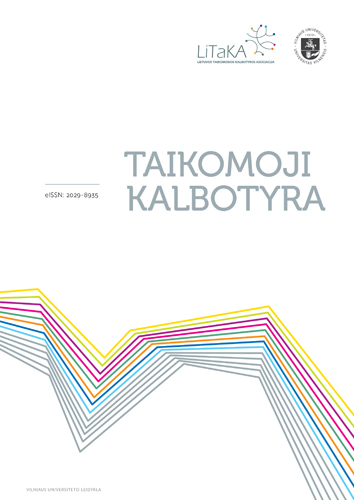Ankstyvoji dvynių kalbos raida: specializuoto tekstyno kūrimas ir duomenų analizė
Early language acquisition in twins: development and analysis of the Lithuanian Corpus
Author(s): Ingrida Balčiūnienė, Eglė Krivickaitė-LeišienėSubject(s): Language acquisition, Psycholinguistics, Sociolinguistics
Published by: Vilniaus Universiteto Leidykla
Keywords: twin language; language acquisition; longitudinal study; corpus linguistics; developmental psycholinguistics;
Summary/Abstract: Twin language is considered to be a unique object of scientific studies in psychology, linguistics, psycholinguistics, sociolinguistics, and speech therapy. Twins tend to lag behind singletons in their language development, but the causes are still unknown. There are many factors affecting the development of twins’ language such as low birth weight, genetic factors, gender, amountquantity of input, intensive interaction between the twins themselves, less interaction with adults than singletons, and many other factors. A commonly held belief is that twins develop their own autonomous and unique communication, also known as ‘secret language’, or ‘private language’. The specific twin language is unique for each pair of twins and cannot be understood by others, not even by their parents.The purpose of this study is threefold: 1) to present a unique Corpus of Lithuanian Twin Language; 2) to discuss the main principles of the Corpus development and methodological issues; and 3) to present the results of pilot research in the Lithuanian twin language.The analysis is based on longitudinal data of one pair of heterozygous twins (a girl and a boy) from Kaunas. The twins’ speech was recorded 2-4 times per week in natural daily situations; (around one and a half hour of recordings per month). The data collection was started when the twins were two years and five months of age. The data was collected by their parents under the supervision of linguists from Vytautas Magnus University. The results of our research attest to manifestations of twin secret language, including the reaction of their parents. In the future, a complex analysis of twin language will be carried out. The results will hopefully be useful not only to researchers, but also to teachers, speech therapists and anyone others who deal with interested in atypical language acquisition.Twin language is considered to be a unique object of scientific studies in psychology, linguistics, psycholinguistics, sociolinguistics, and speech therapy. Twins tend to lag behind singletons in their language development, but the causes are still unknown. There are many factors affecting the development of twins’ language such as low birth weight, genetic factors, gender, amount of input, intensive interaction between the twins themselves, less interaction with adults than singletons, and many other factors. A commonly held belief is that twins develop their own autonomous and unique communication, also known as ‘secret language’, or ‘private language’. The specific twin language is unique for each pair of twins and cannot be understood by others, not even by their parents.The purpose of this study is threefold: 1) to present a unique Corpus of Lithuanian Twin Language; 2) to discuss the main principles of the Corpus development and methodological issues; and 3) to present the results of pilot research in the Lithuanian twin language.The analysis is based on longitudinal data of one pair of heterozygous twins (a girl and a boy) from Kaunas. The twins’ speech was recorded 2-4 times per week in natural daily situations; (around one and a half hour of recordings per month). The data collection was started when the twins were two years and five months of age. The data was collected by their parents under the supervision of linguists from Vytautas Magnus University. The results of our research attest to manifestations of twin secret language, including the reaction of their parents. In the future, a complex analysis of twin language will be carried out. The results will hopefully be useful to researchers, teachers, speech therapists and anyone interested in atypical language acquisition.
Journal: Taikomoji kalbotyra
- Issue Year: 2017
- Issue No: 9
- Page Range: 31-45
- Page Count: 15
- Language: Lithuanian

